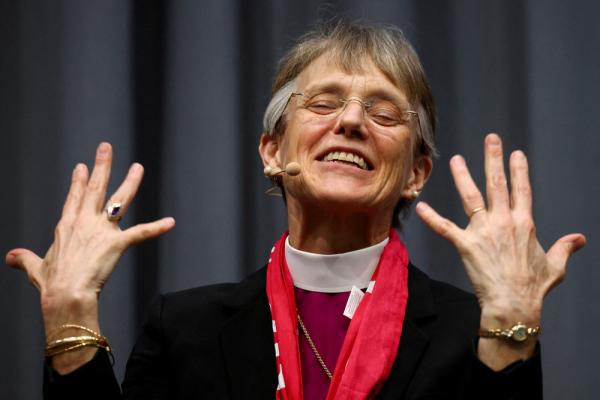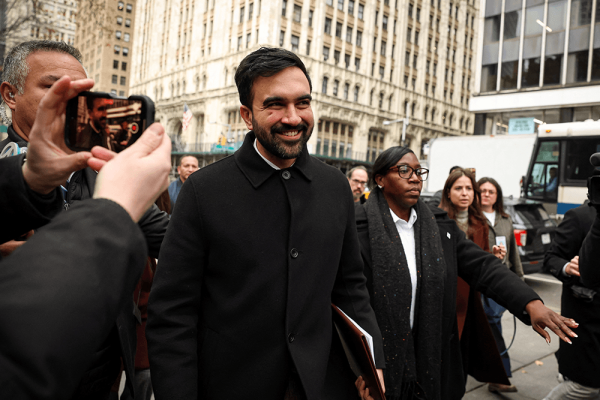The Department of Homeland Security’s move to suspend funding for Catholic Charities of the Rio Grande Valley—and to seek an unusually long ban on future federal grants—is prompting concern among Catholic leaders and immigration advocates who see the action as part of a broader effort to curtail faith-based humanitarian work at the U.S.-Mexico border.
CCRGV, a South Texas nonprofit led by Sister Norma Pimentel, has been given 30 days to respond to DHS’s proposed debarment, which would shut the organization out of most federal funding streams for six years.
The suspension, which applies only to the South Texas organization, not to Catholic Charities USA or other diocesan agencies nationwide, would be a major blow to CCRGV. The charity, which operates the Humanitarian Respite Center in McAllen, Texas, has been a major recipient of DHS funds through the Federal Emergency Management Agency’s Emergency Food and Shelter-Humanitarian program and its newer Shelter Services Program.
I remember the first time I asked Mary to pray for me. It was at the height of the George Floyd protests in June 2020.
“This world is intricately stitched together, boys. Every thread we pull, we know not how it affects the design of things,” muses William H. Macy’s Arn Peeples, an aging tree logger in Train Dreams. Throughout their ongoing work on the construction of the Spokane International Railway, laborers like Arn occasionally ruminate on their place in a broader human tale of hubris and glory, though they don’t have all the answers.
Indeed, the world is intricately stitched together. And the same could be said about the film itself, though, moment by moment, it gives the feeling of a wandering walk in the woods. Much like Arn, director Clint Bentley and screenwriter Greg Kwedar seem aware of their lack of answers—but find asking the questions worthwhile anyway.
The church has a funny sense of time. When everyone else is looking at Spotify Wrapped and other year-in-reviews, the Christian liturgical calendar has already turned the page, insisting a new year is already here. You’d be forgiven for thinking of Advent as an end-of-year marker, but as any theology nerd will remind you, Advent is the first season in the church’s annual cycle, not the last. Which is to say: The church starts the new year not with champagne or fireworks, but with a season of waiting.
In the Northern Hemisphere, this year-end/year-beginning coincides with colder days, longer nights, and bare trees. And it’s in this moment—when it’s gray and freezing and most things look dead—that Christians make a daring claim: This bleakness all around us is not the end, but a beginning. The new life God promises begins in the dark.
Our shared planet is crumbling under the weight of human greed and exploitation; our neighbors are being snatched up and disappeared from our communities; and money for jobs and education is being used to fund wars and genocide. And I’m expected to believe that God is good?
In Rental Family, Brendan Fraser’s character Phillip does a lot of pretending. While looking for gigs as an American actor living in Tokyo, he lands a strange role: “token white guy.” And it gets weirder, the more Phillip learns about it: His new employer, a company called “Rental Family,” doesn’t cast for the stage or the screen. They hire actors—“surrogates”—to play roles in people’s lives, to “help people connect to what’s missing.”
Phillip becomes whatever the company’s clients need him to be: a mourner at a staged funeral, a groom for an anxious bride, the dad who’s finally part of the picture. Sometimes he pretends to be these people for 30 minutes, sometimes he has to pretend for weeks on end. Soon, Phillip comes to love the job he was initially so skeptical of.
This Christmas, I’m looking forward to curling up on a snowy morning with one of my favorite stories: J.R.R. Tolkien’s The Lord of the Rings. Whether in book or film, Tolkien’s high fantasy remains politically relevant and holds a prescient message for the Advent season.
When President Donald Trump and New York Mayor-elect Zohran Mamdani first met back in November, I had to laugh. Partially because there is something deeply absurd about these two men—Mamdani, a self-proclaimed Democratic Socialist, and Trump, who once proclaimed he wished to be a dictator for “one day”—smiling and posing for photos in the Oval Office. But I mainly found myself laughing because, despite the drastic differences between these two politicians, both have been critical to my own faith and political journey.
As Zohran Mamdani prepares to take the New York City mayor’s office, he’s tapped several NYC faith leaders to work on his transition team, centering affordability and day-to-day needs of New Yorkers.
Mamdani’s election was one of the most successful in recent memory. Mamdani, who entered the race as a relatively unknown upstart, defeated former Gov. Andrew Cuomo in a primary and general election—becoming the first candidate since 1969 to earn over one million votes. Over a month after Mamdani’s victory, much of the excitement behind his campaign has yet to waver.
Mamdani’s transition team, made up of 17 advisory committees and more than 400 people helping to advise his incoming administration, received more than 50,000 applications. Among those selected to facilitate his transition are at least 18 faith and religious leaders from a range of traditions.
Of the Christian leaders listed, the denominations represented include Baptists, Seventh-day Adventists, and Episcopalians, spread across committees focused on housing, youth and education, and community safety. Those faith leaders told Sojourners they looked forward to working with the Mamdani administration.
One of the stranger moviegoing experiences of my life was walking out from The Last Jedi and feeling sure I’d experienced a masterpiece. I’m not the most devoted Star Wars fan, but I thought I’d seen something special. I still do. So, you can imagine my surprise when the rest of the world was, shall we say, a little divided on The Last Jedi.
I’m not here to relitigate that whole exhausting conversation now. But while watching that movie, I felt a connection to the filmmaker, Rian Johnson. Something in the way he navigated the power of belief, the handing down of received wisdom, and the challenges of carving new paths in old traditions spoke to me. I was not surprised to later learn that Johnson had been raised in the church, and I was delighted when he decided to take that as both the theme and setting of the third Knives Out film, his wildly popular murder mystery franchise starring Daniel Craig’s Foghorn Leghorn-throated detective Benoit Blanc.







